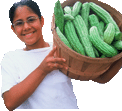While it’s still tricky to negotiate, more and more farmers are finding that you don’t need to own land in order to farm. Owning farmland can be expensive and can make it much more difficult to develop a profitable enterprise. Leasing is one of many options. As the Greenhorns say in their Guide to Farming, in the search for land to farm, “charm, persistence and determination are your best allies.”
Consider the following examples of successful operations established by out-of-the-box thinkers:
- In his book No-Risk Ranching (available from many libraries and most book retailers) farmer Greg Judy describes how he turned his farm around by developing a profitable business model based on raising beef cattle he doesn’t own on land he doesn’t own. He also offers details and advice on approaching landowners and establishing successful leases.
- Do you live in a city where land is scarce and expensive? Consider Rooftop Farms in Brooklyn, or the SPIN-farming model.
- Incubator farms provide inexpensive land access in a central place, and often access to equipment and mentorship to help new farmers get started. The most well-known is the Intervale in Burlington, VT, but more are springing up around the Northeast. Check out the SEED Farm in PA and the Community Farm of Simsbury in CT.
- You might be surprised to find out how many landowners would like to see their land be more productive, but don’t have a desire to farm it themselves. As a bonus, most states offer a reduction in property taxes on land that is in agricultural production, so once you learn the details in your state, you can use this as an incentive with landowners. Here’s one approach: 1) Find several pieces of land meeting your requirements for size, location, and soil type, 2) Go to your county Tax Assessors office to determine who owns them, 3) Send them a very polite letter expressing your interest in farming and inquiring about their willingness to lease their land, and 4) Follow up with a phone call a week or two later, to get their response. Many farmers have found land to buy OR lease using this method.
Leasing Assistance
Great care should be taken when establishing a lease, as there are many issues to address in writing between landowner and farmer, such as lease tenure, infrastructure development, and permitted uses.
For personalized assistance, Land for Good is an organization devoted to keeping Northeast farmland productive. They offer farm transfer planning and can assist with development of strong leases.The New England Small Farm Institute published Holding Ground: A Northeast Guide to Farmland Tenure and Stewardship, a book containing lease language, case studies, worksheets, and non-ownership tenure options.
Another nice publication on creative options for finding land from ATTRA (Appropriate Technology Transfer to Rural Areas) is available online here.

 Information for beginning farmers.
Information for beginning farmers.
